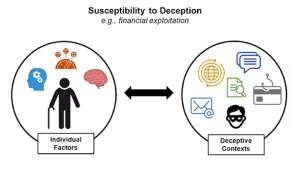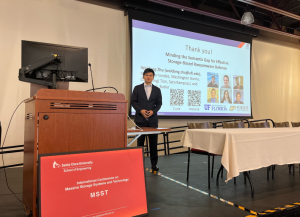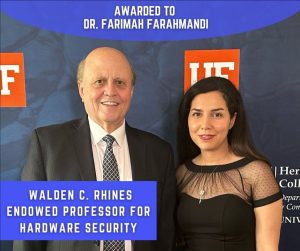
MAJOR NEWS
Dr. Farimah FarahmAndi Named Walden C.Rhines Endowed Professor for Hardware Security.
Dr. Farimah Farahmandi, Associate Director of FICS Research, has been named the inaugural Walden C. Rhines Endowed Professor for Hardware Security. She is the first-ever Assistant Professor ever to be bestowed with this first endowed Professorship. The endowment will support Dr. Farahmandi’s research program, focused on hardware security verification and validation, by extending it to AI-based approaches to ensuring the security in microelectronics in pre- and post-fabrication stages. Dr. Farahmandi is globally known for her pioneering research, which will result in establishing security, safety, and reliability of system-on-chips (SoCs) and system-in-packages (SiPs) deployed to modern critical industrial and DoD applications.
Audio Deepfake expert Dr. Patrick Traynor shares his research with White House Personnel.
Read More
In the news
Are older adults more vulnerable to scams? Dr. Natalie Ebner and Dr. Didem Pehlivanoglu share their research in The Conversation.


In 2021, there were more than 90,000 older victims of fraud, according to the FBI. These cases resulted in US$1.7 billion in losses, a 74% increase compared with 2020. Even so, that may be a significant undercount, since embarrassment or lack of awareness keeps some victims from reporting.
Financial exploitation represents one of the most common forms of elder abuse. Perpetrators are often individuals in the victims’ inner social circles – family members, caregivers, or friends – but can also be strangers. However, older adults have been largely neglected in research on this burgeoning type of crime. Dr Natalie Ebner, Professor of Psychology and FICS Faculty member, and Dr. Didem Pehlivanoglu FICS Postdoctoral Researcher aim to understand the factors that shape vulnerability to deception in adulthood and aging. Cognitive functions, such as how quickly our brain processes information and how well we remember it, decline with age and impact decision-making. For example, among people around 70 years of age or older, declines in analytical thinking are associated with a reduced ability to detect false news stories.
Lack of support and loneliness exacerbate susceptibility to deception. Social isolation during the COVID-19 pandemic has led to increased reliance on online platforms, and older adults with lower digital literacy are more vulnerable to fraudulent emails and robocalls.


Read More
STUDENT SPOTLIGHT
 Congratulations to FICS Research Assistant Weidong Zhu for presenting his research titled “Minding the Semantic Gap for Effective Storage-Based Ransomware Defense” at the International Conference on Massive Storage Systems and Technology (MSST) held at Santa Clara University in San Jose, CA. This research was a combined effort with FICS Research Faculty Dr. Sarah Rampazzi, FICS Research Director Dr. Kevin Butler, and FICS alumni Grant Hernandez. Washington Garcia, Dave Tian.
The work performed in the research addresses the significant issue of ransomware, which results in billions of dollars in financial losses annually. SrFTL, is a novel ransomware defense framework that uses semantic information for effective storage based ransomware detection. SrFTL enforces defense logic within storage devices and Trusted Execution Environments (TEEs), ensuring protection even if the operating system (OS) is compromised and using OS filesystem semantics and I/O patterns in the storage device to device an advanced and highly accurate ransomware classification method. Weidong’s work has already attracted significant industry attention and he has plans to pursue solutions that leverage storage advances to create more secure computer systems.
Congratulations to FICS Research Assistant Weidong Zhu for presenting his research titled “Minding the Semantic Gap for Effective Storage-Based Ransomware Defense” at the International Conference on Massive Storage Systems and Technology (MSST) held at Santa Clara University in San Jose, CA. This research was a combined effort with FICS Research Faculty Dr. Sarah Rampazzi, FICS Research Director Dr. Kevin Butler, and FICS alumni Grant Hernandez. Washington Garcia, Dave Tian.
The work performed in the research addresses the significant issue of ransomware, which results in billions of dollars in financial losses annually. SrFTL, is a novel ransomware defense framework that uses semantic information for effective storage based ransomware detection. SrFTL enforces defense logic within storage devices and Trusted Execution Environments (TEEs), ensuring protection even if the operating system (OS) is compromised and using OS filesystem semantics and I/O patterns in the storage device to device an advanced and highly accurate ransomware classification method. Weidong’s work has already attracted significant industry attention and he has plans to pursue solutions that leverage storage advances to create more secure computer systems.

Save the Date!
The inaugural FICS Research Summit on Cybersecurity for Small Business is scheduled for October 4th in the new Malachowsky Hall. Please contact Moriah@ufl.edu further details.



